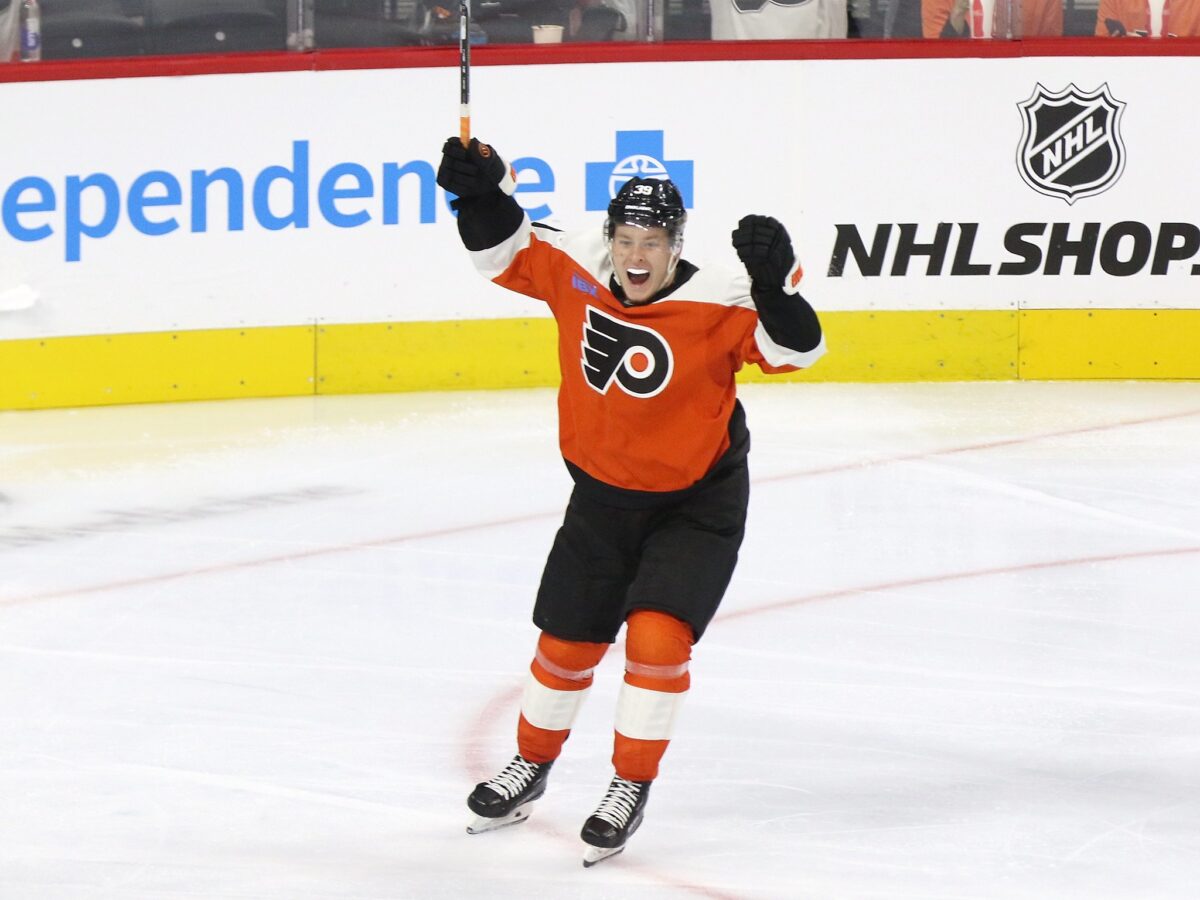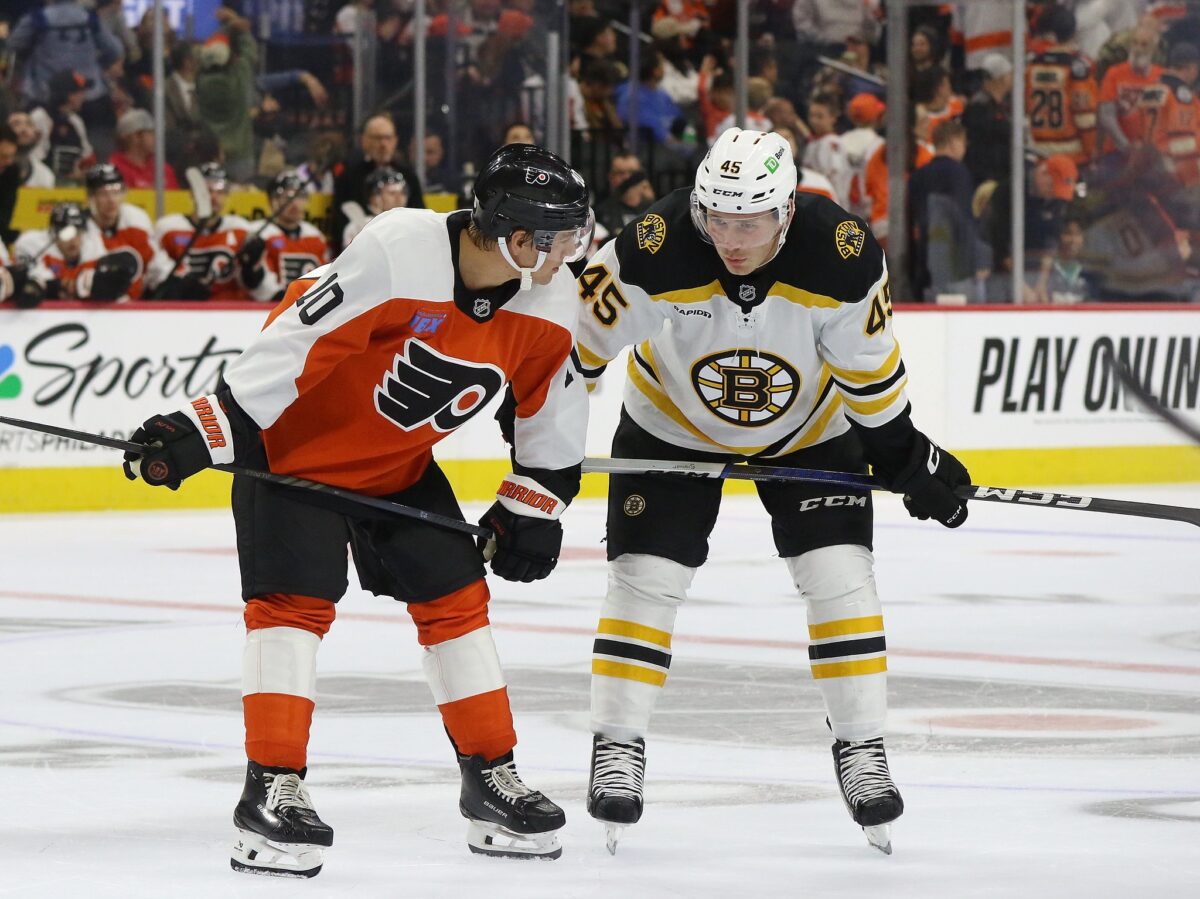The Philadelphia Flyers have a modest 12-12-4 record this season with a prospect pool that doesn’t have projectable franchise talent. Nonetheless, their future is very bright and they can make it a whole lot brighter in the 2025 offseason. The time for them to take the next step has come.
The Flyers might say they’re rebuilding, but this team is at a point where building up is far more beneficial than doing nothing. They’re likely to finish right around the playoff line in back-to-back seasons, but their improving upside is the key. At the latest, the 2025 offseason is the time to take a swing for the sake of the present and the future.
Michkov May Reach Superstar Heights Sooner Than We Thought
As one of Matvei Michkov’s supreme optimists entering this season, I had expectations far beyond the general public. He has surpassed those expectations.
Among the 418 forwards with at least 10 games played this season, he is 47th in points per game (0.96) and 35th in points per 60 minutes (3.37). The latter mark is the fourth best recorded by a teenage rookie with 200 minutes of ice time since 2007-08, behind Connor McDavid (twice) and Steven Stamkos. The only other player above 3.25 is Auston Matthews.
Matvei Michkov has played his final game as a 19-year-old.
— Justin Giampietro (@justingiam) December 9, 2024
His points per 60 (check graphic for qualifications) among teenagers since 2007-08:#LetsGoFlyers pic.twitter.com/G4BJSUNRaT
We don’t have to stop there. While the Flyers are getting better as a possession team, they still aren’t at league-average. It’s easy to overlook, but you need the puck in the offensive zone to score goals (well, most of them, anyway). So, Michkov’s numbers are somewhat understated because of the team he’s playing for.
Through his first 26 games, Michkov scored 7.77 points per 60 minutes spent in the offensive zone. To put that in perspective, that is greater than what six of last season’s top 10 scorers are at in 2024-25:
| Player | Points Per 60 Minutes in the Offensive Zone |
| Nathan MacKinnon | 7.70 |
| David Pastrnak | 5.97 |
| Auston Matthews | 6.76 |
| Mikko Rantanen | 7.25 |
| J.T. Miller | 6.87 |
| William Nylander | 7.17 |
What Michkov is doing as a young rookie is very special; it’s something the NHL hasn’t seen in quite a while. Considering he has only gotten better with time, it wouldn’t be a wild take to have him at a higher-scoring clip by season’s end. Even with his generally unsustainable finishing rate, his constantly growing abilities might make up for a likely-to-decline 22.45 shooting percentage. Or, he could just end up being an incredible finisher his entire career—that is very possible.

What we can be confident in, however, is that he’ll be a better player from season to season. A sophomore slump, while in play, is not the assumption here. The expectation is for your young star player to become a superstar soon. The latter was always the logical outcome for Michkov, so his rookie campaign has been nothing but confirmation—a superstar future is far less surprising than not.
Related: Philadelphia Flyers’ Matvei Michkov Deserves More Ice Time in Key Moments
What this means for the Flyers is that they have to provide him with talent. Despite their early-season struggles, both Owen Tippett and Morgan Frost have proven to be fairly good linemates for the 20-year-old (58.90 expected goals percentage at 5-on-5). But that doesn’t mean the team can’t go a step further.
Looking at those top teenage scorers from the beginning of this section, McDavid had Leon Draisaitl, Stamkos had Martin St. Louis, and Matthews had William Nylander. A majority of the time, those couples were stapled to one another at 5-on-5. Only St. Louis was an established top-of-the-line talent back then, but the big takeaway here is that everyone needs a sidekick. Are we convinced that Tippett and Frost are this?
In order to maximize what Michkov can do in the early stages of his career, the Flyers should prioritize getting him a linemate they think can boost his upside. It could be Travis Konecny, but he has commanded his own line—a long-term connection might not be what the Flyers have in mind. Some new blood is in store.
Flyers Are Closer to Contention Than They Seem
They’ve missed the playoffs four seasons in a row and are on pace to tie a franchise record at five. But the Flyers are closer to contention than meets the eye—a couple of additions may be all they need.
The Flyers have the core pieces to be a good hockey team. A top-four defensive group of Cam York, Travis Sanheim, Emil Andrae, and Rasmus Ristolainen is a very capable one. If Jamie Drysdale continues to play like he did on Sunday (Dec. 8) in his first game back from injury, his potential is through the roof. He, York, and Andrae, plus prospects Oliver Bonk and Spencer Gill are all 23 years old or younger—there’s a budding blue line in Philadelphia.
Related: Philadelphia Flyers Player Grades Through 25 Games
As mentioned extensively, Michkov has superstar potential. Maybe even best-player-in-the-world potential. Soon enough, he won’t just be a point-per-game scorer. That growth is coming, and it will make the Flyers a better team. Working with him is Konecny, a high-level first-liner, and captain Sean Couturier, a legit top-six center when healthy. Tippett has his flaws but his talent and streaks of excellence are undeniable. Tyson Foerster and Bobby Brink have also shown glimpses of valuable play.

Goaltending is probably the most obvious weakness, but ironically the Flyers’ most distinctive strength in their prospect pool. Egor Zavragin and Carson Bjarnason are a few years away but each has NHL starter upside—the former might be the best teenage netminder in the world. Joined by 25-year-old Samuel Ersson and 22-year-old Aleksei Kolosov, there may soon be a time when one of them has to be shipped out due to the magnitude of talent. The goalies presently in Philadelphia (Ersson, Kolosov, and Ivan Fedotov) aren’t contender-level at this stage, but they’ve shown stints of solid play that top teams can make do with.
The reason to be excited about the Flyers is their imperfections. Their holes are fixable with star forwards, who can help tilt the ice in the other direction. Players like Frost and Tippett are above average at driving play but far from elite. This roster needs someone else who can keep the Flyers on the attack more often and create dangerous looks during those possessions. This is the number one path to contention for a team that has basically everything else figured out.
How Can the Flyers Improve Their Forward Group?
Luckily for the Flyers, they had the foresight to accumulate a plethora of assets for the upcoming 2025 draft class. With three first- and second-round selections apiece, they can take plenty of swings on youth in the summer. Just because they’re in a rebuild doesn’t mean they shouldn’t explore their options, though.
The most glaring concern in Philadelphia is still its center depth. Couturier and 18-year-old Jett Luchanko are a start, but that won’t be enough. There are two likely options for what happens in the offseason (or the coming months):
Option One: Flyers Go All-Out on Youth
Will the Flyers really hoard all six of these picks to themselves? It’s always possible. They insist their rebuild is a long-term process, so nobody would blame them for splurging on youth. The concern here is that there wouldn’t be any immediate results and turning these draft picks into stars is far from a guarantee—did we already forget the Brayden Schenn trade?
The Orange and Black have addressed several areas of their roster in recent drafts, but the selection of Luchanko in 2024 might hint at their philosophy in 2025. He was objectively not the player with the highest upside on the board, yet a “rebuilding” team picked him anyway. Why was that? Probably because they legitimately liked the player, but their positional weakness down the middle certainly played a part. This is more than defensible.
The center who clicks with Michkov is automatically an elite one. If the Flyers find someone who makes Michkov a better player, their problem down the middle will virtually be solved. They’ll need to address the rest of the offense, sure, but by far the biggest need is finding their superstar his sidekick. It’s realistic to do this in the draft if enough centermen are selected—you’ll land his partner in crime eventually.
Drafting every center on the board may not be efficient but it could be highly effective. Instead of trading a bunch of picks for an established player, they can get one of their own.
Option Two: Flyers Have Their Cake and Eat It, Too
Philadelphia could also be gearing up for a big trade. They have enough draft capital and other assets (on the roster and in the system) to have their cake and eat it, too.
This option means gunning for a top player—likely a center—and also using the draft to improve the team. If you revisit some of the bigger trades in recent memory, you’ll notice how the entire farm isn’t required to make a splash. It’ll be costly, but nobody will want all six draft picks and young roster players to boot.
If this plays out, the Flyers could instantly become a playoff contender while also bolstering their youth. Players like Foerster, Frost, Ristolainen, Joel Farabee, and Scott Laughton would all be fair game to make this happen. Fans’ hearts sink when they hear some of those names in deals but change is the only way to get better. In sports, fearless teams are often the most successful.
Philadelphia could seriously improve in 2025-26 considering the in-season growth of Michkov and the pieces around him. A young group needing more offensive talent to take the next step, the Flyers may be able to start contending with a big addition or two.
Stats courtesy of Natural Stat Trick (unless specified otherwise)
